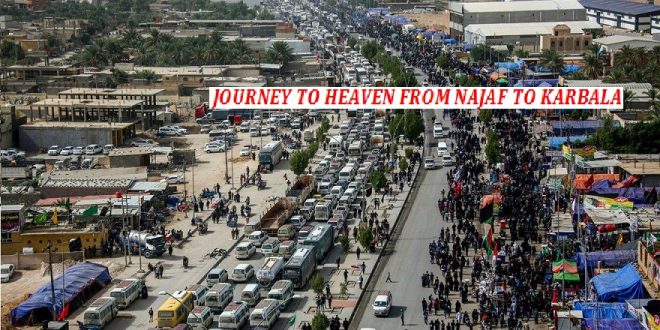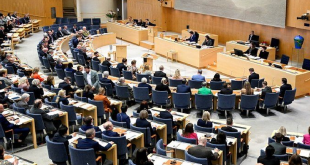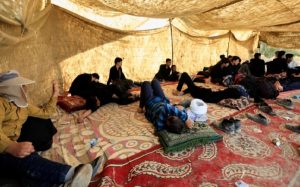16-09-2022
By Syed Najaf Ali Shoukat + Bureau Report + Agencies
 BAGHDAD/ NAJAF/ KARBALA/ KARACHI: Iraqi authorities have increased security nationwide in anticipation of the annual Shi’a Arba’een pilgrimage Sept. 16-17, when millions of pilgrims will converge on the holy city of Karbala. Attendance at this year’s event is expected to be larger than previous years due to the easing of COVID-19 restrictions.
BAGHDAD/ NAJAF/ KARBALA/ KARACHI: Iraqi authorities have increased security nationwide in anticipation of the annual Shi’a Arba’een pilgrimage Sept. 16-17, when millions of pilgrims will converge on the holy city of Karbala. Attendance at this year’s event is expected to be larger than previous years due to the easing of COVID-19 restrictions.
Tens of thousands of security personnel and allied Shi’a militias will deploy to Karbala and roads leading to the city to safeguard pilgrims. Heightened security is also likely in Baghdad, Babil, and Najaf governorates. The increased security is mainly in response to the threat from Sunni extremists. The highest threat of attack exists in Baghdad and on routes to the holy cities of Karbala and Najaf at least a week before and after the event.
Vehicles are likely to be banned in Karbala during the pilgrimage, and authorities will use a dedicated fleet of buses to move people from gathering points on the outskirts of the city to the Imam Hussain and Al-Abbas shrines. Curfews and other restrictions are possible according to the security conditions.
Arba’een marks the end of the 40-day mourning period for Imam Hussain ibn Ali, whose martyrdom at the Battle of Karbala led to the schism between Shi’a and Sunni Muslims. Terrorist attacks targeting Shi’a pilgrims have been relatively common in the past, and security continues to be a major concern.
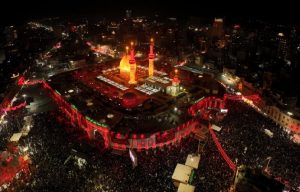 Sectarian tensions will be high, and disputes over religious issues may turn violent. Acknowledging and abiding by Shi’a traditions is important, as perceived affronts to religious conventions have led to angry confrontations with non-Shi’a – including foreigners – in the past. Many Shi’a may carry banners or display posters depicting Imam Hussein or religious verses during the pilgrimage; removing or defiling these items in any way could spark mob violence.
Sectarian tensions will be high, and disputes over religious issues may turn violent. Acknowledging and abiding by Shi’a traditions is important, as perceived affronts to religious conventions have led to angry confrontations with non-Shi’a – including foreigners – in the past. Many Shi’a may carry banners or display posters depicting Imam Hussein or religious verses during the pilgrimage; removing or defiling these items in any way could spark mob violence.
Authorities advised people to stay away from large crowds and sites where pilgrims gather unless observing Arba’een. Allow considerable extra time to reach destinations in Shi’a-populated areas due to increased security and heavy congestion, especially on main routes leading to Karbala. Confirm hotel reservations, transport bookings, and business appointments. Respect local customs; restrict photography, and avoid sensitive topics of discussion, including religious and political issues.
A Pakistani journalist Syed Jaffer Abbas Jafri (SJA Jafri) told Press Media of India (PMI), millions of ardent lovers, in a demonstration of unfathomable love and devotion for their beloved, walk seamlessly and untiringly from one sacred city to another, day and night, braving inclement weather and ominous security threats.
Men and women, young and old, they come from different corners of the world and converge at one place. They call it heaven.
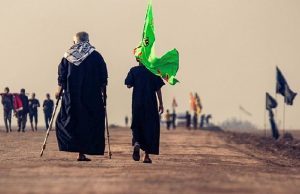 It is not an excerpt from a gripping page-turner, laced with figments of imagination. It is a beautiful miracle I saw unfold before my eyes a couple of years ago. A miracle that repeats every year.
It is not an excerpt from a gripping page-turner, laced with figments of imagination. It is a beautiful miracle I saw unfold before my eyes a couple of years ago. A miracle that repeats every year.
If you haven’t guessed already, I am talking about the largest and the greatest rally against terrorism and extremism that takes place in the second lunar month, forty days from Ashura, which marks the martyrdom of Imam Hussain (AS) and his followers in the desert plains of Karbala 14 centuries ago.
It’s not merely a walk. It is a mark of protest against all forms and manifestations of terrorism, fascism, imperialism, despotism, and oppression perpetuated by state and non-state actors.
It is a rallying cry in support of the oppressed, weak and powerless. It is a reaffirmation of pledge to uphold the principles exemplified by the ‘master of challengers’ in Karbala.
An estimated gathering on the occasion of Arbaeen in Iraq this year is almost 53 million while 24 hours left to end the Arbeen walk from Najaf to karbala, Jafri added.
Irfan Gangjee is one of the millions of Shia Muslims who have travelled on foot for days to reach the holy city of Karbala in Iraq to participate in Arbaeen, one of the largest annual religious events in the world.
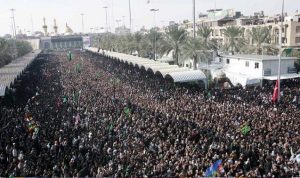 The Pakistani citizen, who lives in the United States, started his journey on Monday in Najaf, 180 kilometres (111 miles) south of the capital city of Baghdad, walking nearly 80km (50 miles) to reach Karbala on Thursday, the site of al-Husayn’s shrine and resting place.
The Pakistani citizen, who lives in the United States, started his journey on Monday in Najaf, 180 kilometres (111 miles) south of the capital city of Baghdad, walking nearly 80km (50 miles) to reach Karbala on Thursday, the site of al-Husayn’s shrine and resting place.
Arbaeen itself will begin on Friday evening and end on Saturday evening.
“The experience was surreal … there are oceans and oceans of people here. People on crutches and wheelchairs were walking with us … women and children too,” the 35-year-old Gangjee, on his first Arbaeen in Iraq, told PMI.
The occasion is observed 40-days after Ashura, the commemoration of the death of the Prophet of Islam, Hazrat Muhammad’s grandson, Hazrat Imam Hussain (Alaihis Salam/ AS), in the Battle of Karbala, which took place in 680 AD on the 10th day of Muharram, the first month of the Islamic calendar.
Imam Hussain-AS and his small party were vastly outnumbered, and martyred after a short battle against the forces of the Umayyad Caliph Yazid I (Lanati).
The event is regarded as one of the foundational moments of Shia Islam.
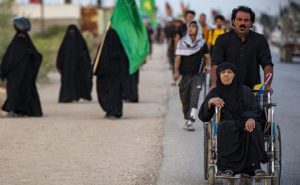 In 2019, it was estimated that the annual pilgrimage had brought together more than 14 million people from across the world, including Iran, Lebanon, Indonesia, Pakistan, India, Saudi Arabia, Australia, New Zealand, France, United Kingdom and the US.
In 2019, it was estimated that the annual pilgrimage had brought together more than 14 million people from across the world, including Iran, Lebanon, Indonesia, Pakistan, India, Saudi Arabia, Australia, New Zealand, France, United Kingdom and the US.
The journey can be strenuous.
Sarah Mushtaq, a 35-year-old woman from Karachi, Pakistan, said at one point during the walk that her “feet just wouldn’t move” and described briefly collapsing on the side of the road.
“Physically it’s a pain I have never felt before, but spiritually I have never felt more alive,” Mushtaq, a henna tattoo artist, told PMI.
The journey is especially challenging during daytime, when temperatures range between 36 and 41 degrees Celsius. Together with packed crowds, reports of people fainting due to exhaustion or feeling dehydrated are not uncommon.
To facilitate Zaireen (pilgrims), local volunteers, as well as foreigners, setup mawakeb (rest areas), makeshift stalls and clinics all along the roads to provide essentials such as food, water and beds.
“This one mawakeb I stayed overnight had served some 1,000 people a day and it’s all for free … they don’t ask for anything in return,” Gangjee, a finance professional, said. “It is hard to fathom the scale at which this gathering is taking place.”
According to Mehdi Hazari, a Shia religious scholar and the head of education and research at the Imam Mahdi Association of the Marjaeya (IMAM) in the United States, a major reason for the non-obligatory pilgrimage is “searching for “inspiration in this world for which Imam Husayn died for”.
“In this world where there is so much noise … things are happening everywhere. Today we can hear about one event in one part of the world to the next with the press of a button our phone. It creates a blindness of sort … we have become complacent,” he said from North Carolina.
“So the walk … is where a person can find their heart awakened … meaning there is this sense overwhelming sense of giving, of sharing without asking for anything in return that creates this humanity, a type of brotherly and sisterly love.”
Echoing Hazari’s sentiments, Mushtaq said that the trip had completely broken her down “physically, mentally and spiritually” and that she now had the chance to rebuild herself.
“What I hope to gain is to take this feeling with me back to reality. Here people see the best version of you. When you go home, this feeling will last a week, a month maybe?” she said.
“I want to incorporate this experience into my daily life … and teach my kids what it really means to be a lover of Imam Hussain-AS.”
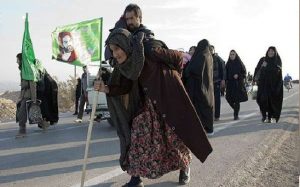 Pandemic, political instability
Pandemic, political instability
This year is the first time since the coronavirus pandemic began in March 2020 that Arbaeen will take place without restrictions or a cap on foreign travelers.
Last year, Iraqi authorities limited the number of foreign travelers to 40,000 people, with 30,000 allowed from Iran.
There has, however, been political instability to worry about this year.
Tensions between political forces led to an outbreak of violence on the streets of Baghdad at the end of August, leaving more than 30 people dead.
Some countries began urging their citizens not to travel to Iraq as a consequence.
However, for Gangjee, nothing was going to stop him.
“Sometimes you just have a calling. In the first 10 days of Muharram this year I made the decision to go … I spoke to my wife and booked my trip immediately,” Gangjee said.
“It never occurred to me after that to cancel my flight. The only way I would not go is if they didn’t allow me in.”
 Pressmediaofindia
Pressmediaofindia
